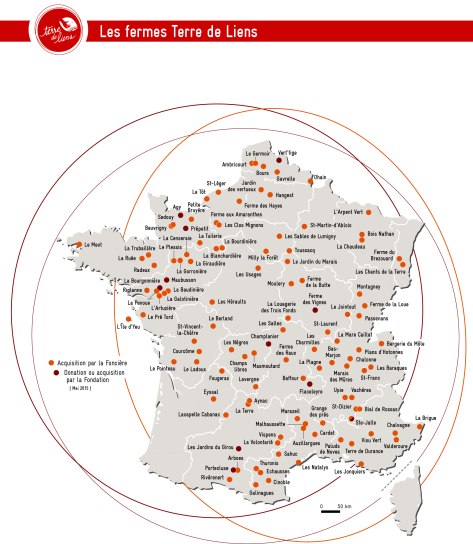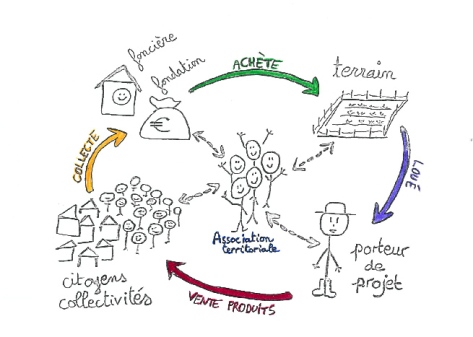
Logo source ![]()
"Decommodify land in perpetuity" and experimenting new ways of managing land as commons is Terre de Liens' (TdL) mission. The french organization helps (future groups of) paesants to find land and cultivate it organically.
It's main tool is to Finance Commons Provisioning. TdL purchases land with civic donations and so called "solidarity savings".
The fundamental premise of Terre de Liens is that the value of farmland lies in its contribution to food production, lasting ecosystems and human life. So when people invest in the group’s farmland, they choose not to make a profit. Technically, they are shareholders of a private company, but practically, they know that the land will not be sold back as long as Terre de Liens continues to exist. (Rioufol/Wartena 2015 a)
# Where?

Terre de Liens Farms in 2017
source ![]()
# When did it start?
... in 2003 from the convergence of individuals with diverse backgrounds in people’s education, organic and biodynamic agriculture, ethical finance, solidarity.based economy and rural development.

La Foncière source ![]()
# Legal Status
Terre de Liens is a multi-faceted organisation, but not a federation. It is composed of several entities and 3 different legal forms:
- Not-for-profit associations: one at a national level and (in 2017) 19 regional ones. They are united by a founding Charter and governance ties. > Terre de Liens Founding Charter
- A private company limited by shares (Ltd), called La Foncière html ![]() :
- A Land Trust, called La Fondation, which collects donations in cash or in kind from individuals, companies (patronage) and public authorities. (cf Community Land Trust
:
- A Land Trust, called La Fondation, which collects donations in cash or in kind from individuals, companies (patronage) and public authorities. (cf Community Land Trust
# Inspired by:
Add the theories other (historical) practices this governance proposal/practice draws from.
xxxxx
# Terre de Liens in Numbers (2017) - Over 12000 citizens involved + even broader impact through awareness-raising activities - Over €43 millions raised (€41 million in investment and €2 million in donations) - 150 farmers established or maintained on 110 farms (partially or fully) owned by Terre de Liens; about 1000 (future) farmers each year advised and supported -> farmers wishing to find land, form collective ownership structures, farm on communal land etc. - Local work in all 20 regions of France - 2500 hectares of farmland preserved "meant to remain in organic and peasant farming in perpetuity"
These 2500 hectares are thus removed from the commodity market and preserved for sustainable agricultural use.
In its beginnings, TdL wrote a Charter to Declare Shared Purpose & Values. See for details: Terre de Liens Founding Charter
The farms are bought, owned and supported by TdL. They are located in all regions of France, are diverse in size and in production: vegetables, dairy products, cereals and bread, fruits, pigs, poultry, sheep, beer, honey, etc. Almost all farms market their products locally (farm shops, local markets, caterers or as part of community-supported agriculture). Many also process food, offer training and education or agro-tourism services.
And yet, it seems clear that TdL manages successfully to Keep Commoning & Commerce Distinct, as the most important shared resource, the land, is purchased with donations and savings. That is: "still in capitalist ways", as Rioufol and Warteny write, but with money free from economic interests. The land is then taken out of the market and legally protected as commons.
YOUTUBE b3ZKL1IkYmU Terre de Liens in a minute, French
It is obvious, that a commons friendly property regime is at the core of TdLs strategy. Here is how they try to Relationalize Property:
- land is aquired with donations and savings and then rented to established or future farmers in the long run under the condition that these take good care of the natural resources, land, landscapes and buildings. In other words: The farmer doesn't enjoy full individual property rights, but something similar: long term leasing rights. It is similar to a trust. - The savings are collected by La Foncière: who agrees with TdL's values and goals can adquire shares of €103.59 - with tax deduction of 9%) it then buys agricultural land and buildings, which are rented out to farmers on long-term leases. - The purchase and installment process of farmers is assisted by local voluntary collaborators of TdL who cooperate with full time staffers of the regional TdL organizations. - Sadly, it is not legal in France to convert "shares" into a public utility [David, their translation was: "to make a public issue of shares] without being registered with the Financial Markets Regulatory. -> a commons-unfriendly-policy
This proceeding is a very concrete way to Direct Capital to Commons Provisioning: ethical investment with 0% financial return accompanied by crop tours, participatory workshops, etc. "Shareholders" receive "no financial dividends. At best, they may have an inflation-based re-evaluation of the value of their shares at some point, and may qualify for income tax rebate, on a limited scale. The benefits that investors seek are nonfinancial ones: direct connection to a farm, good local food, fertile soils and biodiversity, preservation of a local activity and a sense of belonging." (Rioufol/Wartena 2015 a).
Honor Transparency in a Sphere of Trust: ADD TEXT HERE
Assure Commoners' Consent in Decisionmaking: ADD TEXT HERE
Terre de Liens brings together citizens, farmers, local authorities and others in jointly working for sustainable land use. It is thus committed to Strenghten Commons Public Circuits, keeps local authorities informed about land access issues, cooperates with them during the establishment or maintenance of local farmers, for the development of a greenbelt, etc.
In terms of environmental protection, TdL and farmers agree on an environmental rural lease.
Beat the Bounds of Capitalocentrism:
Accept State Mediation & Support if Needed: ADD TEXT HERE
Emulate & Then Federate: TdL is emulated at regional levels. The single entities are connected based on shared values; but don't form a federation.
others
# Additional Information
TdL is member of the Access to Land Coalition, html ![]() . This network, established in 2012, brings together grassroots organisations from across Europe, 15 in 2017, to share experiences and promote the significance of access to land for agroecological transition and generational renewal.
. This network, established in 2012, brings together grassroots organisations from across Europe, 15 in 2017, to share experiences and promote the significance of access to land for agroecological transition and generational renewal.
# See also
# Sources
Access to Land (European Network), website html ![]() Terre de Liens, website html
Terre de Liens, website html ![]() Véronique Rioufol and Sjoerd Wartena (2015a): Terre de Liens: Experiencing and Managing Farmland as Commons, html
Véronique Rioufol and Sjoerd Wartena (2015a): Terre de Liens: Experiencing and Managing Farmland as Commons, html ![]() Véronique Rioufol and Sjoerd Wartena (2015b): Decommodifying Land. Terre de Liens, pdf
Véronique Rioufol and Sjoerd Wartena (2015b): Decommodifying Land. Terre de Liens, pdf ![]() personal communication between 2013 and 2016
personal communication between 2013 and 2016
